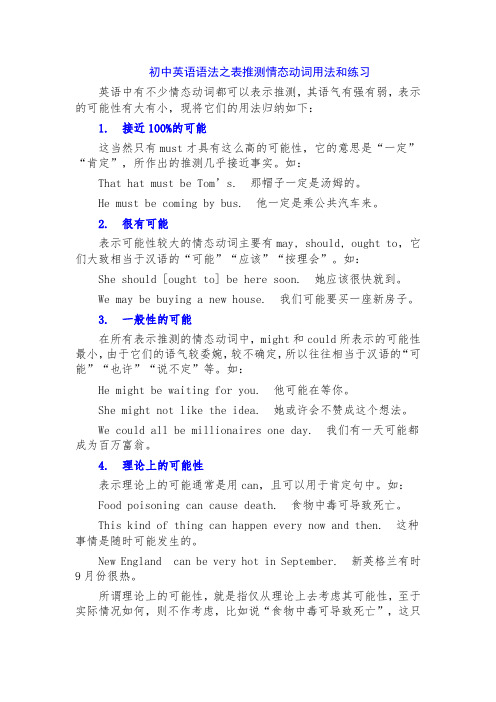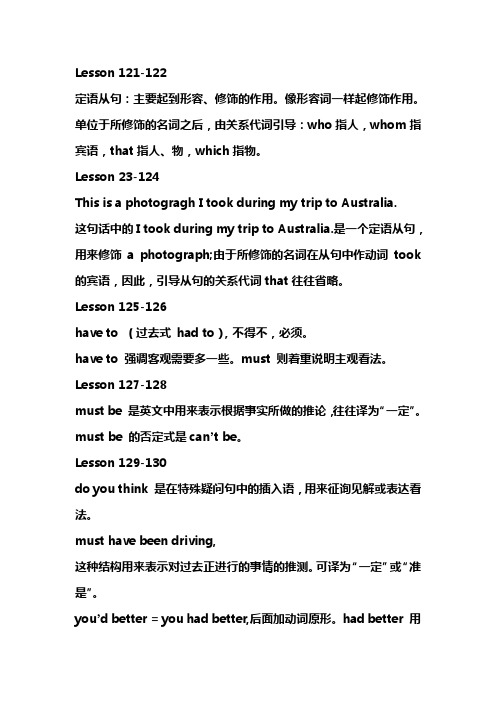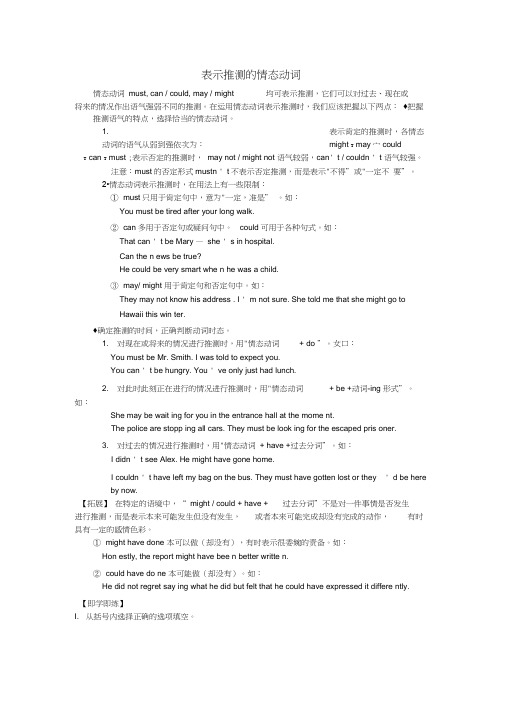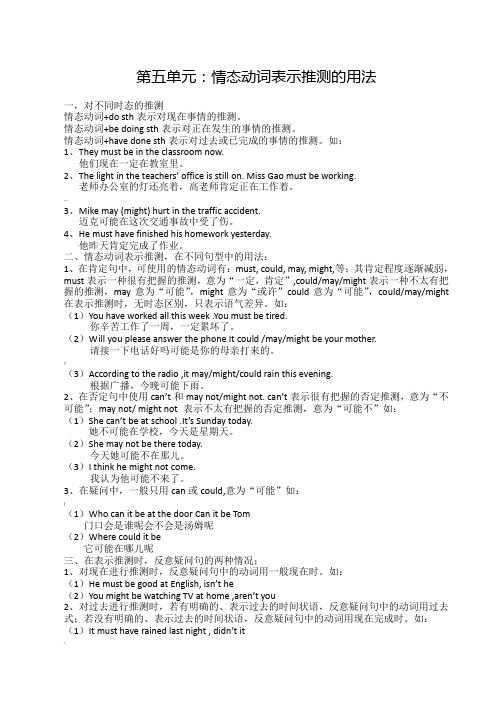Lesson 127-130 情态动词的推测
情态动词表推测的用法

第四页
Shall &should
请求 征求意见
Shall we put off the sport meeting until next week? Shall Tom go there with me tomorrow?
警告
允诺
威胁等
You shall if you don’t work harder.
4.Accident can happen to any drunken driver.
可能性
5.It can’t be my father.He is now in England.
第二页
May &might
1.可能性
He may be very busy now.
He might be very busy now.
第七页
情态动词表示推测
1)might,may
表示主观的推测,
一般用于肯定句
Might------“也许” May------“可能”
否定 否定
Eg:He might be right.他也许是对的。
might not
may not
He may not come tonight.他今晚可能不来
第八页
第十二页
3)need后接完成式主要用于否定句中。
“needn’t + have done ”表示本不必要做某事
Eg: You needn’t have watered the flowers,for it is going to rain.
①--Isn’t that Ann’s husbandபைடு நூலகம்over there?
④---Cathrine,I have cleaned the room for you.
初中英语语法之表推测情态动词用法和练习

初中英语语法之表推测情态动词用法和练习英语中有不少情态动词都可以表示推测,其语气有强有弱,表示的可能性有大有小,现将它们的用法归纳如下:1. 接近100%的可能这当然只有must才具有这么高的可能性,它的意思是“一定”“肯定”,所作出的推测几乎接近事实。
如:That hat must be Tom’s. 那帽子一定是汤姆的。
He must be coming by bus. 他一定是乘公共汽车来。
2. 很有可能表示可能性较大的情态动词主要有may, should, ought to,它们大致相当于汉语的“可能”“应该”“按理会”。
如:She should [ought to] be here soon. 她应该很快就到。
We may be buying a new house. 我们可能要买一座新房子。
3. 一般性的可能在所有表示推测的情态动词中,might和could所表示的可能性最小,由于它们的语气较委婉,较不确定,所以往往相当于汉语的“可能”“也许”“说不定”等。
如:He might be waiting for you. 他可能在等你。
She might not like the idea. 她或许会不赞成这个想法。
We could all be millionaires one day. 我们有一天可能都成为百万富翁。
4. 理论上的可能性表示理论上的可能通常是用can,且可以用于肯定句中。
如:Food poisoning can cause death. 食物中毒可导致死亡。
This kind of thing can happen every now and then. 这种事情是随时可能发生的。
New England can be very hot in September. 新英格兰有时9月份很热。
所谓理论上的可能性,就是指仅从理论上去考虑其可能性,至于实际情况如何,则不作考虑,比如说“食物中毒可导致死亡”,这只是理论上的一种推断,至于某人某次食物中毒了,他是否会死亡,则不在考虑之列,所以说,这种推测是非常“宏观”的!5. 表示对过去情况作推测如果表示对已经发生的情况作推测,不能用“情态动词+动词原形”,也不能用“情态动词的过去式+动词原形”,而是要使用“情态动词+动词完成式”。
lesson131-132(情态动词表推测三)

lesson131-132 周三练习(情态动词表推测三)一、知识总结:情态助动词may和might【用法】1. may和might都表示可能性,意为“可能”、“也许”,通常可互换使用;两者都用于肯定句中,其可能性比must要小;might要小;当情况是虚拟时只能用might而不能用may。
(1)may/might may/might + 动词原形(2)may/might may/might + be doing(3)may/might may/might + have done/have been doing(4)may/might may/might + have been doing★2. may和might might比may语气更委婉一些,否定回答时要用mustn’t表示“不可以”、“禁止”之意。
—May/Might I use your pen? 我可以用你的钢笔吗?—No, you mustn’t. 不,不可以。
★May I …? 表示征求对方许可,在文体上比较正式,在口气上比较客气。
在日常口语中,用Can I …? 更为常见。
总结:can不肯,may不问,must肯定不否问。
1will you;②表示邀请、劝说时,用won’t you.如Be sure to ring me, will you? Come to have dinner with us this evening, won’t you?今天晚上和我们一起吃饭,好吗?2其反义疑问句通常只用will you.Don’3、Let开头的祈使句构成反义疑问句时,除其他均用will you.如:Let’s take a break,shall we? 让那个男孩先走,好吗?练习:125-131课单词词组大练习:肯定是________________不可能是________________我不这样想____________________________再看一眼________________看起来很老________________ 至少________________ 最多________________很久以前________________超过________________去国外________________我不敢肯定________________去埃及________________拿定主意,下定决心________________可能是________________花很长时间________________别那么肯定________________太多________________照看,照顾________________最后________________ 别担心________________祈使句的反义疑问句:1. Let’s go, __________?2. Don’t make such noise, ________?3. Teacher, let us go out to play, ___________?4. Let’s go together, _____________?5. Let each man decide for himself, ___________?6. Let us go together,________?7. Come and join us, _________? 8. Don’t fight with others, _________?祈使句的反义疑问句1. Let’s do it at once, ______ ? A. shall we B. will you C. do we D. do you2. John, read the text for us, ______ ? A. does he B. will he C. do you D. will you3. Don’t forget to post the letter, ______ ? A. will you B. won’t you C. do you D. don’t you4. - Let’s go for a walk, ______ ? - OK, I’m coming. Don’t forget to bring your camera, ______ ?A. will you; will youB. will you; shall weC. shall we; shall weD. shall we; will you5. Your girls stand in the front row, ______ ? A. do they B. will they C. do you D. will you6. - They work hard, don’t they?- ______ . They always work overtime(加班).A. Yes, they doB. No, they doC. Yes, they doD. No, they don’t7. - You don’t smoke, do you?- ______ . I have never smoked a cigarette before.A. Yes, I don’tB. No, I don’tC. Yes, I doD. No, I do情态动词( ) 1. May I take these magazines out of the reading-room? No, you ______.A. won’t B. don’t C. needn’t D. mustn’t ( ) 2. Martin and Gary ______ go abroad. I’m not sure. A. can B. might C. will D. must( ) 3. I may ______ so, but I can’t remember whether I did it or not. A. say B. be saying C. have said D. said ( ) 4. You ______ return the book now. You can keep it until next week. A. can’t B. mustn’t C. don’t D. needn’t ( ) 5. ------ Did your brother break the window?------ I don’t know, but he ______ have done it.A. wouldB. mayC. willD. can( ) 6. I ______ charge you this time. But you’d better not do it again. A. won’t B. can’t C. may not D. mustn’t ( ) 7. The light is out in her room. She ______ to bed. A. must have gone B. had gone C. must be going D. must go ( ) 8. ------ You must be here at 5:30 tomorrow morning. ------ Sorry, I ______ be here so early.A. needn’tB. mustn’tC. can’tD. may not( ) 9. ------ Is the boy by the window your brother? ------ It ______ him.A. need beB. would beC. maybeD. may be( ) 10. ------ Do you have to write to your friend?------ Sorry, but I really ______.A. can’tB. mustC. haveD. should。
Lesson121-130英语笔记

Lesson 121-122
定语从句:主要起到形容、修饰的作用。
像形容词一样起修饰作用。
单位于所修饰的名词之后,由关系代词引导:who指人,whom指宾语,that指人、物,which指物。
Lesson 23-124
This is a photogragh I took during my trip to Australia.
这句话中的I took during my trip to Australia.是一个定语从句,用来修饰a photograph;由于所修饰的名词在从句中作动词took的宾语,因此,引导从句的关系代词that往往省略。
Lesson 125-126
have to (过去式 had to),不得不,必须。
have to 强调客观需要多一些。
must 则着重说明主观看法。
Lesson 127-128
must be 是英文中用来表示根据事实所做的推论,往往译为“一定”。
must be 的否定式是can’t be。
Lesson 129-130
do you think 是在特殊疑问句中的插入语,用来征询见解或表达看法。
must have been driving,
这种结构用来表示对过去正进行的事情的推测。
可译为“一定”或“准是”。
you’d better = you had better,后面加动词原形。
had better 用
于建议在将以具体场合采取动作,而不用于一般情况,比 should 语气更为强烈,常有威胁、告诫或催促的意味。
高中英语Unit13Lessons3-4Grammar-表示推测的情态动词讲练北师版必修5

表示推测的情态动词情态动词must, can / could, may / might 均可表示推测,它们可以对过去、现在或将来的情况作出语气强弱不同的推测。
在运用情态动词表示推测时,我们应该把握以下两点:♦把握推测语气的特点,选择恰当的情态动词。
1. 表示肯定的推测时,各情态动词的语气从弱到强依次为:might T may宀couldT can T must ;表示否定的推测时,may not / might not 语气较弱,can' t / couldn ' t 语气较强。
注意:must的否定形式mustn ' t不表示否定推测,而是表示"不得”或"一定不要”。
2•情态动词表示推测时,在用法上有一些限制:①must只用于肯定句中,意为"一定,准是” 。
如:You must be tired after your long walk.②can多用于否定句或疑问句中。
could可用于各种句式。
如:That can ' t be Mary —she ' s in hospital.Can the n ews be true?He could be very smart whe n he was a child.③may/ might 用于肯定句和否定句中。
如:They may not know his address . I ' m not sure. She told me that she might go toHawaii this win ter.♦确定推测的时间,正确判断动词时态。
1. 对现在或将来的情况进行推测时,用"情态动词+ do ”。
女口:You must be Mr. Smith. I was told to expect you.You can ' t be hungry. You ' ve only just had lunch.2. 对此时此刻正在进行的情况进行推测时,用"情态动词+ be +动词-ing 形式”。
情态动词表示推测的用法

第五单元:情态动词表示推测的用法一,对不同时态的推测情态动词+do sth表示对现在事情的推测。
情态动词+be doing sth表示对正在发生的事情的推测。
情态动词+have done sth表示对过去或已完成的事情的推测。
如:1、They must be in the classroom now.他们现在一定在教室里。
2、The light in the teachers’ office is still on. Miss Gao must be working.老师办公室的灯还亮着,高老师肯定正在工作着。
…3、Mike may (might) hurt in the traffic accident.迈克可能在这次交通事故中受了伤。
4、He must have finished his homework yesterday.他昨天肯定完成了作业。
二、情态动词表示推测,在不同句型中的用法:1、在肯定句中,可使用的情态动词有:must, could, may, might,等;其肯定程度逐渐减弱,must表示一种很有把握的推测,意为“一定,肯定”,could/may/might表示一种不太有把握的推测,may意为“可能”,might意为“或许”could意为“可能”,could/may/might 在表示推测时,无时态区别,只表示语气差异。
如:(1)You have worked all this week .You must be tired.你辛苦工作了一周,一定累坏了。
(2)Will you please answer the phone It could /may/might be your mother.请接一下电话好吗可能是你的母亲打来的。
?(3)According to the radio ,it may/might/could rain this evening.根据广播,今晚可能下雨。
初中情态动词表推测的用法及练习(经典)
(一)情态动词表推测的1.在肯定句中一般用 must (一定),may (可能),might (也许,或许)。
( 1 ) The photo must be Lu ’s, those must be their parents.( 2 ) The policeman may know the way to that school.( 3 ) The notebook may belong to Jim, it ’s on his desk.( 4 ) If you have any idea where it might be, please call me.2.否定句中用 can’t / couldn’t(不可能 ), may not/might not( 可能不)。
( 1 )It can’t/couldn’t be the headmaster. He has gone to America.这不可能是校长,他去美国了。
(2 ) The doctor may not/might not be in the hospital now,It’s nearly six o’clock.3.疑问句中用 can/could (能……?)。
( 1 ) Could he have finished the task?他可能把任务完成了吗?( 2 ) Can he be at home now?他现在能在家吗?注:以上三种句式中情态动词的语气按程度都是依次递减的。
might, could 并非 may, can 的过去式,而表示语气较为委婉或可能性较小。
(二)情态动词表推测的1.对现在正在进行的动作推测时,用“情态动词 + be +doing”。
例: He must / may / might / could be listening to the radio now. 他一定/可能/ 也许正在听收音机。
(2021年整理)情态动词表推测用法总结及专项练习
(完整版)情态动词表推测用法总结及专项练习编辑整理:尊敬的读者朋友们:这里是精品文档编辑中心,本文档内容是由我和我的同事精心编辑整理后发布的,发布之前我们对文中内容进行仔细校对,但是难免会有疏漏的地方,但是任然希望((完整版)情态动词表推测用法总结及专项练习)的内容能够给您的工作和学习带来便利。
同时也真诚的希望收到您的建议和反馈,这将是我们进步的源泉,前进的动力。
本文可编辑可修改,如果觉得对您有帮助请收藏以便随时查阅,最后祝您生活愉快业绩进步,以下为(完整版)情态动词表推测用法总结及专项练习的全部内容。
(完整版)情态动词表推测用法总结及专项练习编辑整理:张嬗雒老师尊敬的读者朋友们:这里是精品文档编辑中心,本文档内容是由我和我的同事精心编辑整理后发布到文库,发布之前我们对文中内容进行仔细校对,但是难免会有疏漏的地方,但是我们任然希望 (完整版)情态动词表推测用法总结及专项练习这篇文档能够给您的工作和学习带来便利。
同时我们也真诚的希望收到您的建议和反馈到下面的留言区,这将是我们进步的源泉,前进的动力.本文可编辑可修改,如果觉得对您有帮助请下载收藏以便随时查阅,最后祝您生活愉快业绩进步,以下为 <(完整版)情态动词表推测用法总结及专项练习〉这篇文档的全部内容.情态动词表推测用法总结及专项练习1.can / could用于表推测的用法(1)从使用句型上看,can 通常只用于否定句或疑问句,一般不用于肯定句,而could 可用于肯定句、否定句和疑问句。
两者没有时间上的差别,只是could 比 can 更委婉,更不确定.如:It can’t [couldn’t] be true. 那不可能是真的。
What can [could] they be doing?他们会在干什么呢?We could go there this summer. 今年夏天我们可能要去那儿。
注:can 有时也用于肯定句中表示推测,主要用于表示理论上的可能性(即从理论上看是可能的,但实际未必会发生),或表示“有时”之意.如:Even experienced teachers can make mistakes。
Lesson126-130
第二十六单元核心语法1.I have to leave immediately.Do we have to walk to the station?2. It must be Karen Marsh, the actress.He can’t be a dentist.3. You must have been driving at 70 miles an hour.He can’t have been reading.扩展语法1.have to 表示必须must 和have to 都表示“必须”。
must是情态动词,而have to 是普通动词短语。
二者在肯定句可以互换,表示不可逃避的责任或义务。
must 带有说话人的主观色彩,而have to则更强调客观要求和外界影响。
must 一般只能表达现在的必要性,而have to则也可以表达过去或将来的必要性。
试比较:你必须现在就走吗?Yes, I have to leave at once.是的,我不得不马上走。
Yes, I must leave now.是的,我必须马上走。
I shall have to go to London tomorrow.我明天将不得不去伦敦。
He had to stop smoking because it was forbidden in his company.因为他所在的公司禁止吸烟,所以他不得不戒了烟。
have to的否定回答可用needn’t ,也可以用don’t have to ,两者都表示没有必要;而mustn’t却表示绝对的禁止,根本没有商量的余地。
如:Do I have to leave so early? 我必须那么早就走吗?’t.No, you don’t have to. 不,不必。
You mustn’t trespass the street. 你不可以横穿马路。
2.表示猜测和推新的情态助动词must be 和can’t bemust be和can’t be 都是用于针对现在某种情况的推测。
情态动词表示推测 配套课件
知识小结
情态 动词 must
mபைடு நூலகம்y
can
对现在和未来的 推测
must do
may do
can do
对过去的推测 must have done may have done can have done
使用场合 肯定句
肯定句、否定句 否定句、疑问名
情态动词表示推测
知识讲解
must “一定;肯定”一般用于肯定句
e.g. Tom must be in the classroom. 对现在情况进行推测 The boys must be very cold in such a day! They must have heard this piece of news. 对过去情况进行推测
---Something ___D_____ to him.
A. must happen
B. should have happened
C. could have happened D. must have happened
4. He __B__ have completed his work, otherwise, he wouldn’t be enjoying himself by the seaside.
can“可能;也许”用于疑问句和否定句 e.g. Tom can’t be in the classroom. It is empty!
They can’t have heard this piece of news. 对过去情况进行推测 Can the story be true?
即时练习
- 1、下载文档前请自行甄别文档内容的完整性,平台不提供额外的编辑、内容补充、找答案等附加服务。
- 2、"仅部分预览"的文档,不可在线预览部分如存在完整性等问题,可反馈申请退款(可完整预览的文档不适用该条件!)。
- 3、如文档侵犯您的权益,请联系客服反馈,我们会尽快为您处理(人工客服工作时间:9:00-18:30)。
NCEI-D Lesson 127-128重点卡片 1. 词汇 著名的 女演员 至少 男演员 通过阅读得知 2. 短语
一定是 再看一看 3. 句子 Can you recognize that woman? 你能认出那个女人吗? It must be Karen Marsh. 那一定是卡伦马什。 Isn’t he her third husband? 他不是她第三个丈夫吗? Doesn’t Karen Marsh look old? 卡伦看上去不显老嘛! She does, doesn’t she! 是的,谁说不是呢! Not that long ago. 没有那么久。 I’m not more than twenty-nine myself. 我自己现在还没29岁呢。
Exercise: Lessons 127—128 一、选择 1 . He was a famous writer when I was A at the school B at school C in school D for school 2 . The town is famous its hot spring A at B in C for D with 3 . He be a dentist A mustn’t B needn’t C hasn’t D can’t 4 . They must be the office now A at B on C for D of 5 . I think you right A don't ,aren’t B don't ,are C /,aren’t D didn't ,weren’t 6 . Let me have look A other B the other C another D an 7 . Our teacher is fifty-two A at least B in least C for least D for less 8 . I often do my homework in the evening ,but I am going to watch TV this evening
A instead B instead of C still D yet 9 . We water the garden. A need B need to C needn’t to D don't need 10 . “I think he is from America” “No,I don't think ” A that B so C this D he isn’t 11 . They are waving us now A for B at C after D to 12 . Some students are a race track A at B on C for D to 13 . He has been driving seventy miles an hour A for B at C on D in 14 . He was doing his homework his mother came in A when B if C after D because 15 . The teacher told them in the street A don’t play B to not play C not to play D not playing 16 . You’d better the window A to not open B not open C not to open D not opening 17 . He must be fifty No ,He be fifty A can’t B mustn’t C couldn’t D needn’t 18 . Let me your driving licence A to see B to look C see D look
二、给出下列动词的三种形式 过去式 过去分词 现在分词 read water offer grow forget have think sit begin run
完成下列句子 1. 我认为你不对 I think you right 2. 当我还在上学时,他就是一名演员了 He a famous actor when I still 3. 那是好久以前的事了,对吗? That a long time ago, ? 4. 警察旁边那人是谁? Who is that the policeman? 5. 让我看一看你的护照 Let me your passport 6. 你最好不要课上说话 You’d better in class 7. 学生们应当听从老师的意见 The students should the teacher’s 8. 这次我就不罚你款了 I won’t you 英汉互译 1. 我自己还没有30岁呢. _______________________________________________ 2. 我们可以去乘公共汽车去火车站 _______________________________________________ 3. 他实在是太令人讨厌了! _______________________________________________ 4. 他不可能是年纪最大的一个. _______________________________________________
NCEI-D Lesson 129-130重点卡片
1. 词汇 招手 跑道 英里 超车 限速 做梦、思想不集中 标记 驾驶执照 罚款 亲爱的
2. 短语 朝你招手 在赛车道上 以每小时70英里的速度 罚你的款 听从我的劝告
3. 句子 He wants you to stop. 他要你停下来。 You must have been driving at seventy miles an hour。 你刚才一定是以每小时70英里的速度开车。
I must have been dreaming. 我一定是思想开小差了。 But you’d better not do it again. 但是你最好不要再这样了。 Next time you’d better take my advice. 下次你最好还是听从我的劝告吧。 Exercise: Lessons 129—130 一、选择 1. I think it is not ____ A. that long ago B. those long ago C. ago that long D. ago these long 2. Who’s ____ beside the man over there? A. this B. that C. Tom D. which 3. She must be at least ___ A. forty and fifty B. forty or fifty C. the forty and the fifty D. the forty or the fifty 4. That ____ be my pen. Mine is here in my hand. A. can B. must C. need D. can’t 5. He ___ be Mr. Smith. I know him well. A. need B. must C. can D. will 6. I drove slowly ____ the road. A. on B. in C. from D. to 7. Mrs. White arrived ____ at 6 o’clock yesterday. A. home B. in home C. at home D. at home 8. I’m afraid ____ he cannot see you now. A. and B. that C. of D. then 9. Where ____ you are? A. you think B. do you think C. you have thought D. are you thinking 10. You ___ do it again. A. had better not B. had better not to C. would better not D. would better not to
二、根据句子意思填入正确单词,单词首字母已给 1. China is f____ for the Great Wall. 2. The a_______ finished her performance on the stage. 3. Look, he is w________ to us on the train. 4. If you lose your way, look the s______ over there. 5. There are ten m_____ from this town to that one. 6. I love you, d______. 7. I have got a driving l_____ 8. The s______ limit is 50 km/h.
三、填入所缺单词 1. Wait _____me out there. 2. The bus stops _____ the bus stop. 3. I got up ______ 6 o’clock. 4. The policeman wanted him ____ stop.. 5. You must have been driving ____ 100 miles per hour. 6. You ___ better do it now. 7. I didn’t see the sign _____ all. 8. Take ___ advice, son. 9. You’d better ____ do it again. It’s too dangerous. 10. She must be ___ least forty.
